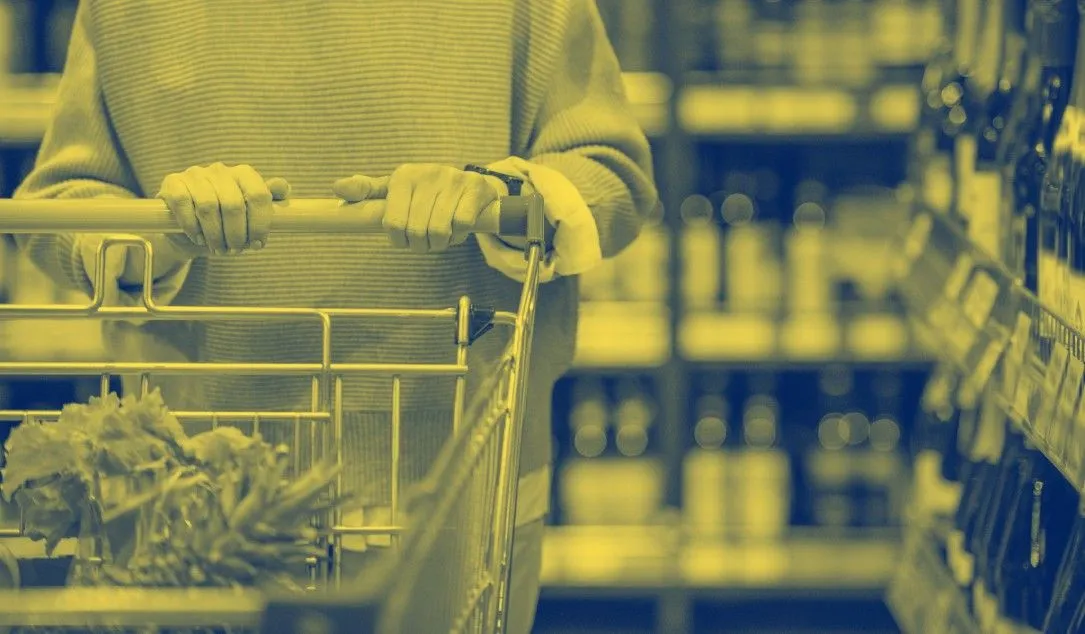In a letter Friday to Kroger CEO Rodney McMullen, Congresswoman Rashida Tlaib (D-MI) said the plans — which involve using facial recognition tools in digital displays to target advertising to customers and collect information on them — potentially pave the way for biased pricing discrimination.
“Studies have shown that facial recognition technology is flawed and can lead to discrimination in predominantly Black and Brown neighborhoods,” Tlaib wrote in the letter, which was posted on social media Tuesday. “The racial biases of facial recognition technology are well documented and should not be extended into our grocery stores.”
Kroger is the largest grocery store chain in the country with nearly 3,000 stores and $3.1 billion in profits in 2023. Kroger and other retailers already use electronic shelving labels instead of paper labels to rapidly adjust prices based on a variety of factors, including time of purchase, where a grocery store is located and other data.
The plan to use facial recognition technology could allow the retailer to build individual profiles on customers, based on data like their gender and shopping habits.
In an August letter sent to McMullen about the same plans, Sens. Elizabeth Warren (D-MA) and Bob Casey (D-PA) said they were concerned about the chain building “personalized profiles of each customer, and then use those profiles ‘to determine how much price hiking each of us can tolerate,’ quickly updating and displaying the customer’s maximum willingness to pay on the digital price tag.”
The use of facial recognition tools in Kroger stores also raises concerns about how Kroger intends to “adequately” safeguard customer data, the Warren and Casey letter said.
“To be clear, Kroger does not and has never engaged in ‘surge pricing,’” the statement said. “Any test of electronic shelf tags is designed to lower prices for more customers where it matters most.”
Isn’t that the same thing? It doesn’t matter if you raise prices on demand or lower them, the outcome is the same - different pricing at different times.
This is all a misunderstanding! The high price IS the regular price. We lower the prices at certain times to benefit our customers, who we love so very much. This is totally not surge pricing!
deleted by creator
“Alright you chucklefuckers. Here’s the new law. You are required to have paper tags, the only discount you can offer is paper coupons sent through the mail to everyone in an area, and you’re never allowed to alter your prices more than once per week.”
Alternative prices
Yeah see it’s not surge pricing! We actually lower prices whentheresnobodyintheaisle so that the discounts are passed on to you! Also we list the lowered price in the ads and apps so when you come in you can be surprised by power of our tech! and the updated price
“We are just figuring out though”
“No, no, it’s totally different to lower prices when fixed income people are shopping and at all other times leave them the same, our lawyers were very certain of that.”
We need a law in the US banning the use of computer assistance for identifying humans. Hands down. It’s not accurate, and it only emboldens people controlling resources.
I donr think you underatand who rules the US…
This ia a featuee of the system, not a bug
Please inform us. Who rules the US in reality?
Corporations
Well then just reference a Corporatocracy. Don’t add some weird mystery about what you mean.
Corps are just orgs no matter what the court says.
They are owned by people and they are ran for the benefit of these people at expense of people who have to buy goods and services from them.
This arrangement is fundamentally an oligarchy, corporate layer is a maxipad for the plebs to cope.
The oligarchs who each own a large steak in critical enterprises for the economy, which permits them to dictate policy and extract value from the state via various transfers from the treasury via tax regimes, loans or other state aid.
Kinda weird for presumably an adult not to know this… but i guess we get politics we deserve after all
Common plebs can’t even ID their owners 🤡
Are we talking t-bone or ribeye?
I aint got no beef, I am a vegetarian!
Riiiight. Thank you for reminding me that I ALWAYS forget about those “five jew bankers”. Is it “four jew bankers”? How many Jewish people are in the mix here, and how mad should be about this?
you tell me: https://en.wikipedia.org/wiki/List_of_wealthiest_Americans_by_net_worth
also bringing up jews when the ruling regime is being criticized is a bad faith tactic attempting to derail the discussion. keep it up, regime whores!
Daddy dindu nuffin, mate! Enjoy your amazing healthcare, housing and education
Riiiight. Saying what you’re saying is totally equivalent to bringing up the same old bullshit that’s been used for hundreds of years.
So Oprah is in control of the community college classes I take and the AA meetings I go to which radicalize me? So confused. Where should I be going to find out the REAL TRUTH?
damn boy, who hurt u?
I think they are absolutely, positively, going to breach their face database and everyone’s purchase history all over the Internet.
I’ve been watching for an event like this with popcorn ready.
I’ve got a good/bad/terrible feeling that they’re playing for keeps in the race to be the biggest consumer privacy headline public relations disaster.
Purchase histories are already traded online i thought
If companies can’t protect the information they collect now, (a large portion of it gathered without consent), how are they going to protect even more information; and where can I opt out?..smh
The opt out comes in the form of a can of spraypaint.
No it comes from taking your money somewhere else. Why would you continue shopping at a place that makes you feel the need to vandalize their property to feel safe?
What do you propose I do when every supermarket in the area is doing this?
Or when all the supermarkets in your area are owned by Kroger?
Begin eating the rich.
I think I’ll try vandalism before cannibalism actually thanks
Your loss!
Two options:
- wear something that prevents facial recognition (something like Reflectacles, for example)
- don’t shop at Kroger
I’m doing the latter, but I’m probably going to pick up some anti-facial recognition stuff as well, just to screw with the various other orgs that do this (gonna try going through the airport w/ them as well the next time I travel).
Third option: force the government to outlaw this bullshit
That can take months if not years. Civil disobedience can be done today.
Okay, then that would be option #4 (because neither of the two things you previously mentioned are civil disobedience).
They are, just not disobedience against a government, but against what stores want you to do.
When was the last time peasants forced anything in the US?
Asking for a friend…
Kroger owns a number of stores, making it even harder to not shop there: https://www.scrapehero.com/store/wp-content/uploads/2021/09/Kroger_Company_USA.png
Fortunately we have a different chain in my area: Associated Food Stores.
I’ve thought about Reflectacles too, but I doubt the cameras use infrared in a store that’s already very well lit.
Great idea though, and I hope they work on countermeasures that work with visible light cameras too
My understanding is that’s how most facial recognition is done regardless of lighting, because they can blast it to get a better read without bothering people, and the more accurate facial recognition solutions use eyes (solves the problem of different skin tones, facial hair, etc).
They certainly use visible light cameras, but they don’t necessarily run their facial recognition w/ visible light.
don’t shop at 75% of the grocery store in the USA == don’t shop Kroger
Is it? In my area, here are some alternatives:
- Associated Food Stores
- WinCo
- Walmart
- Target
- Trader Joe’s
- “ethnic” stores - Hispanic, Asian, etc
Some of those are regional, so fill in whatever exists in your area (e.g. Aldi in the NE US). Kroger brands are maybe 20% of the stores in my area. I used to shop at them primarily (they were the closest), but they’re now less convenient than other stores (takes an extra 10 min to get there). Even when I lived right next to a Kroger-brand store, there were still at least two other options within 10 min drive.
And I’m not even in a particularly densely populated area, I’m in the suburbs in Utah, about 30-45 min from downtown.
Kroger also owns: Ralphs, Dillons, Smith’s, King Soopers, Fred Myer, Fry’s, QFC, City Market, Owen’s, Jay C, Pay Less, Baker’s, Gerbes, Harris Teeter, Pick‘n Save, Metro Market and Mariano’s.
Thank fuck I haven’t heard of a single one of those stores and have never shopped in them
More of a hardcore Jewel/Osco shopper?
No - I think Mariano’s and PicknSave would be competitors in that region. I travel a bit through the US, and I’m flummoxed. My Kroger discount card works more times than not, no matter where my work takes me and no matter which the local branding is.
deleted by creator
That’s not surprising, if you live outside of the US. Otherwise, I do have a follow up query for you 😅
I’m in the us. Must be a west coast thing.
Kroger is big in the east, the others are bigger in the west IIRC. And OP missed Fred Meyer, which is big in the PNW.
Missed Fred Meyer, which is huge in the PNW.
I don’t shop at any of those, mostly because it’s not my closest grocery store. It is the biggest though, I just don’t want to drive the extra 10 min to go there vs my local one w/ competitive prices.
Added
Isn’t there a whole big deal about Fred Meyer merging with them and some anti monopoly bs going on?
They want to merge with Albertsons, who owns the other half of grocery stores: Acme, Safeway, jewel osco, and a bunch more.
Ah that explains it
And now Safeway!
But don’t worry, there’s still Walmart as an option.
May I introduce you to our lord and savior, Aldi?
I wish you would! The closest one to me is just under 1,000 miles away.
deleted by creator
As an aside, I personally don’t understand why people would choose Kroger over Walmart
Fuck Walmart.
This is why. Kroger is terrible but Walmart is worse.
I wouldn’t necessarily even consider the quality better at Walmart than it is at Kroger so, while both are bad, Walmart is definitely worse for a lot of other reasons.
We switched from Kroger to a couple of international groceries. It’s hit and miss quality wise, but this way I’m only supporting at most a handful of greedy shitbags.
This is a privacy intrusion that should be banned nationally.
The US government should already be breaking up Kroger for its monopolistic practices.
I suspect most of the C Suite is simply waiting for whatever they see as the peak of their share price to sell off everything and move on to their next parasitic host.
US government enables oligopolies, why would they stop now?
Because the “US Government” is not a monolithic entity but rather, a large and complex democratic organisation that citizens can influence the composition of through political participation.
citizens can influence the composition of through political participation.
So much good housing, education and healthcare… much influence, big access to power 🤡
Yeah, so It turns out fewer people care about and really want those things than you think…
Hurt me harder daddy
Surge pricing=price gouging, there is no difference
They did with airline tix and rents…
Now time to bring this technology into your grocery store!
Mask mandates may not be in effect but I can wear one to the grocery store. This is stupid and I will not participate.
Oh no, I accidentally smudged a little bit of paint over the facial recognition camera lens… Oops!
Going to be hard to do when it’s under a little black dome 45 feet up in the air. Also there’s dozens of them…
Be careful to never shine a 20mW green laser into the lens of a camera!!
Go on…
sounds like a sombrero situation
Oh no, I accidentally put paint in a super soaker and it squirted upwards on the camera! Silly me, I’m such a klutz!
Paint ball gun ftw
A Kroger spokesperson said in a statement that the company’s business model is built on a “foundation of lowering prices to attract more customers.” “To be clear, Kroger does not and has never engaged in ‘surge pricing,’” the statement said. “Any test of electronic shelf tags is designed to lower prices for more customers where it matters most.”
I know these PR people get paid a lot to tell bald-faced lies, but I just don’t understand how they live with themselves.
Because they’re high-functioning sociopaths. About 1 in 100 people are, and they tend to gravitate into executive, sales, legal, marketing, “law” enforcement, and other careers where having little to no empathy or conscience is a distinct advantage.
And people who own shit prefer to hire them for this “talent”
Discounts is just reverse surge pricing. Just think of the absence of discount as the surge.
In the USA, facial recognition isn’t legal in some states (e.g. the company needs written permission from the individual to collect their facial data in Illinois), and other stores have had issues with facial recognition (e.g. https://www.ftc.gov/news-events/news/press-releases/2023/12/rite-aid-banned-using-ai-facial-recognition-after-ftc-says-retailer-deployed-technology-without) so I’m not sure how Kroger think they’ll succeed with this.
Honestly, they’ll probably miss that and pay massive fines in Illinois. It seems to be the traditional approach by companies that get into facial recognition to also not bother to listen to anyone who could have told them not to.
Well, they wrote some letters. There’s nothing more the nations law makers can do to protect citizens from corporate greed and price gouging. /s
We need a large, well-organized movement to demand that the government add a right to privacy to the US Constitution.
This is how you end up with laws mandating paper cards with pricing information.
And it definitely won’t negatively affect people of color, at all, will it?












